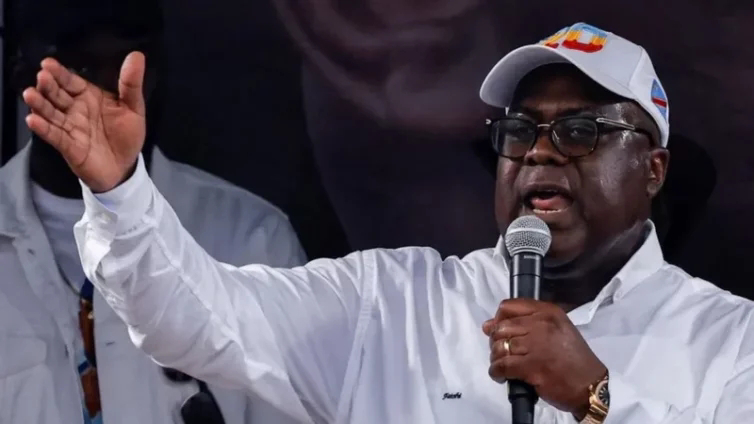President Félix Tshisekedi has been declared the winner of Democratic Republic of Congo's election, which has been condemned as a "sham" by several opposition candidates demanding a rerun.
The president won about 73% of the vote, with his nearest challenger, Moise Katumbi, on 18%, officials said.
The 20 December election was marred by widespread logistical problems.
It had to be extended to a second day in some parts of the vast country.
About two-thirds of polling stations opened late, while 30% of voting machines did not work on the first day of the vote, according to an observer group.
Millions of people waited for hours before they were able to vote, while some gave up and went home.
The opposition said the problems were part of a deliberate plan to allow the results to be rigged in favour of Mr Tshisekedi, 60.
Several of the main challengers have called for protests after Sunday's announcement.
"We call on our people to take to the streets en masse after the proclamation of the electoral fraud," they said in a joint statement.
The army has been deployed in various parts of the capital, Kinshasa, to prevent any unrest, while Mr Tshisekedi's supporters have taken to the streets to celebrate.
The head of the election commission has previously said the opposition candidates wanted a new election because "they know they lost... they are bad losers".
Election chief Denis Kadima acknowledged some irregularities but insisted that the results reflected the will of the Congolese people.
President Tshisekedi will be sworn in for a second term on 20 January.
The son of veteran opposition leader Étienne Tshisekedi, the president was first elected in 2019.
That followed a poll which some observers, including the influential Catholic Church, said was won by former oil executive Martin Fayulu. He came third in this election with 5% of the vote.
None of the other 16 candidates gained more than 1% of the vote.
Mr Kadima said turnout was about 43% of the 41 million registered voters.
It is not clear if any of the 18 opposition candidates will challenge the results in court. Mr Katumbi has already said it is not worth it, because the courts are not independent.
The Constitutional Court has 10 days to hear any legal challenges before it is due to announce the final results on 10 January 2024.
DR Congo is roughly four times the size of France, but lacks basic infrastructure. Even some of its main cities are not linked by road.
About two-thirds of the country's 100 million population live below the poverty line, earning $2.15 (£1.70) a day or less.
Voters also chose parliamentary, provincial and municipal representatives, with about 100,000 candidates in total.
During the campaign, Mr Tshisekedi repeatedly lashed out at Rwanda's President Paul Kagame, who he accuses of backing the M23 rebel group which has seized territory in the east of the country. Rwanda has repeatedly denied the charges.
In his last election rally, Mr Tshisekedi vowed to declare war on Rwanda, although observers dismissed this as rhetoric aimed at whipping up nationalist sentiment.
The elections were not held in parts of the east because of the fighting which has raged in the area for the past three decades. Some seven million people have been forced from their homes - more than in any other country except Sudan.
Dozens of armed groups are battling to control parts of the region, home to much of the country's vast mineral wealth.
This includes vast reserves of cobalt, a vital part of many lithium batteries, seen as essential to a future free of fossil fuels.
Credit: BBC

